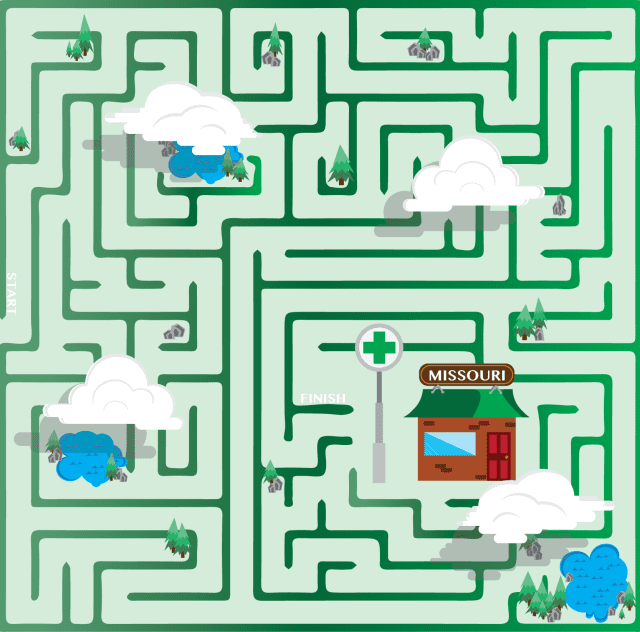 With all of the state legal marijuana ballot initiatives out there, 2016 is going to be a big year for cannabis.
With all of the state legal marijuana ballot initiatives out there, 2016 is going to be a big year for cannabis.
As a result, we are ranking the fifty states from worst to best on how they treat cannabis and those who consume it. Each of our State of Cannabis posts will analyze one state and our final post will crown the best state for cannabis. As is always the case, but particularly so with this series, we welcome your comments. Today we turn to number 38: Missouri. Our previous rankings are as follows: 39. Florida; 40. Arkansas; 41. Montana; 42. Iowa; 43. Virginia; 44. Wyoming; 45. Texas; 46. Kansas; 47. Alabama; 48. Idaho; 49. Oklahoma; 50. South Dakota.
Missouri
Criminal penalties. In 2014, Missouri passed Senate Bill 491, which decriminalized simple possession of marijuana and reduced sentences for selling and cultivating marijuana. It also ended a ban on probation or parole for marijuana offenders with three felony offenses.
Though Missouri’s decriminalization is certainly progress, it has some shortcomings. SB 491 it will not take effect until January 1, 2017. The current penalties are as follows:
- Possession. Less than 35 grams of marijuana can result in up to one year in prison and a $1,000 fine. Possession of between 35 grams and 30 kilograms is punishable by a maximum one-year sentence a $5,000 fine. Missouri classifies the possession of larger amounts as drug trafficking.
- Distribution. The sale of less than 5 grams can earn 7 years in prison and a $5,000 fine. The sale of between 5 grams and 100 kilograms earns 5 to 15 years in prison, along with a fine between $5,000-$20,000. The sale of more than 100 kilograms is punishable by a sentence of 10 years to life imprisonment without the possibility of parole or probation and a fine of $5,000-$20,000. Those same penalties apply for sales within 2,000 feet of a school or 1,000 feet of public housing.
- Trafficking. Offenders in possession of 30-100 kilograms of marijuana face trafficking charges, punishable by a sentence of 5-15 years in prison a and a fine of $5,000-$20,000. If the offender possesses more than 100 kilograms he or she can face between 10 years-life imprisonment and fine between $5,000-$20,000.
SB 491 will make the following changes once it takes effect on January 1, 2017:
- Possession. Possession of under 10 grams will be punishable with a jail sentence not to exceed 15 days. However, this will only apply to a person’s first offense.
- Distribution. The sale of under 35 grams will result in a maximum sentence of 4 years in prison.
Medical Marijuana. In 2014, Missouri passed a high-CBD low-THC medical marijuana bill, as have several other traditionally conservative states. As we often see with these laws, it had some glaring flaws. Most prominent among its flaws is that there is no legal mechanism for patients to access marijuana.
However, a more expansive medical marijuana regime may go into effect this November. The Missouri legislature is currently considering House Bill 2213, which would legalize the use, sale and cultivation of marijuana for medical use in Missouri. The bill still has obstacles to overcome before becoming law, but it has passed through two important committees. The House Emerging Issues Committee and the House Select Committee on General Laws both approved the measure.
HB 2213 would allow patients with “debilitating conditions” to obtain and use medical marijuana. The list of conditions will be determined by physicians. The Missouri Division of Alcohol and Tobacco Control would regulate the cultivation, manufacture, distribution and sale of medicinal marijuana. The agency would issue licenses to 30 cultivation centers and 30 distribution centers.
Missouri voters may alternatively establish a workable medical marijuana regime through the initiative process. New Approach Missouri has drafted an initiative that would amend Missouri’s Constitution to allow for medical marijuana. Its website contains the following summary:
Pro-patient: Instead of creating a short and restrictive list of qualifying conditions, this initiative puts power in the hands of a state-licensed physicians, not politicians or bureaucrats, to determine who will benefit from medical cannabis.
Robust System for Access: The initiative creates a statewide system for production and sale of medical cannabis and medical cannabis products. It also provides for limited and regulated patient cultivation.
Small Tax to Benefit Missouri Veterans: The initiative levies a four percent retail tax, and all revenue in excess of the cost of regulating the medical cannabis program will go to help Missouri’s veterans.
Public Safety: The initiative maintains the current prohibition on public use and driving under the influence. It also allows the Department of Health and Senior Services to institute a seed-to-sale tracking system to ensure that the product and money do not reach the illicit market.
Regulatory Framework: Puts Missouri Department of Health and Senior Services in charge of licensing and implementation, but also allows the department to contract with other state agencies when necessary for effective and efficient regulation.
Quick Implementation: The amendment creates deadlines to make the department move quickly to promulgate rules, issue applications, and swiftly implement and award patient cards and industry licenses.
Recently, the Missouri Secretary of State approved New Approach’s petition to qualify for the November ballot. The group must obtain roughly 160,000 signatures to qualify.
Bottomline. Missouri is in transition with its cannabis laws. The criminal penalties are harsh but will be lessened by decriminalization. Missouri currently has a poor medical marijuana program, but that law could change by year’s end. Missouri is getting better but until its new and proposed laws are in place it is far behind most other states. Missouri refers to itself as the “show me state” and so we urge Missouri to show us better marijuana laws. Until then, it’ll stay in the bottom half of our rankings.























